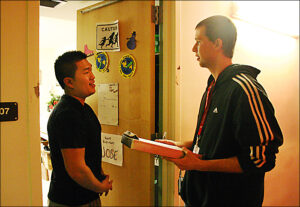At this point, you have likely heard that typical list of traditional financial aid options: loans, scholarships, grants, work-study programs—you know them all by heart. But before you think you’ve exhausted all of your resources, there’s an exceptional option for students at almost all schools that have residence halls: becoming a resident assistant (RA).
Personal Experience
Becoming an RA was easily one of the best decisions I ever made, and one from which I reaped countless benefits.
I gained experience in leadership, time management, communication, and an abundance of other traits that would remain unenhanced if I didn’t take on the position. But what lasted for me were the ongoing relationships I’ve maintained with my residents.
When it’s cold outside, I fall asleep under a blanket that was signed lovingly by all the residents of my senior year.
Their claims of me being “the best RA in the world” is incredibly rewarding—not in the sense that it’s self-assuring, but in the sense that I helped to give them the best possible freshman year residence hall experience.
Benefits
The title varies by school: resident assistant, resident advisor, community advisor, etc. But most, if not all, RA programs compensate the student in some manner.
As an RA, I was given free room and board, and a small stipend off of tuition. In the two years I served, I estimate that I saved about $15,000.
With that in mind, I encourage students and parents to look into this as a financial aid option. But first, make sure the reasons for becoming an RA are not solely based on paying for college.
It’s a rewarding job, but one that requires a 24/7 commitment and an acute preparedness on multiple levels.
Here are some other benefits of the position
1. Gain résumé-building qualities
Being an RA demands certain qualities: organization, compassion, creativity, adaptability. These are all traits future employers want to see both on résumés and in interviews.
2. Learn how to handle emergencies
Whether it’s a test fire alarm or an outbreak of swine flu, RAs need the ability to keep a calm demeanor in emergencies. The crises that can arise in a residence hall are a unique introduction to emergencies that can happen in companies or communities.
3. Get organized
RAs organize meetings and activities for their floors/dorms, attend RA-specific institutional meetings, and will likely be on-call at some point. This is all in addition to personal, academic, social, and extracurricular demands, so resident assistants need to prepare to embark on a balancing act that takes incredible organization.
4. Network
As an RA, students will meet a diverse range of people with varying races, religions, backgrounds, majors, interests, and much more. They can and should take advantage of being immersed in such a tight-knit group of diverse people by making both friendly and professional connections.
5. Build friendships
RAs often build lasting friendships with their residents. Additionally, the other RAs become like family since everyone lives together, works together, and depends on one another for support.

